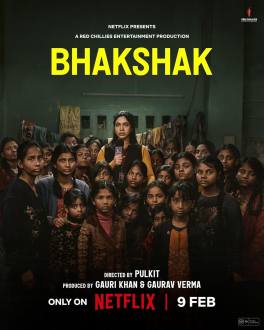Bhakshak, which premiered on Netflix on February 9, 2024, is a crime drama that tackles a heavy subject with a mix of grit and good intentions, though it doesn’t always hit the mark. Inspired by the harrowing Muzaffarpur shelter case, it follows Vaishali Singh (Bhumi Pednekar), a small-town journalist in Bihar, as she uncovers systemic abuse at a girls’ shelter run by the sinister Bansi Sahu (Aditya Srivastava). Directed by Pulkit and produced by Red Chillies Entertainment, the film aims to shine a light on corruption and the power of dogged journalism, but it’s a middling effort that’s as earnest as it is uneven.
Bhumi Pednekar is the film’s backbone, bringing a quiet fire to Vaishali. She’s convincing as a woman driven by outrage and empathy, her resolve growing with every obstacle—be it apathetic officials or threats to her life. Her final monologue, a straight-to-camera plea about societal apathy, lands with force, even if it feels a tad on-the-nose. Sanjay Mishra, as her cameraman Bhaskar, is a reliable sidekick, injecting dry humor and warmth into an otherwise grim tale. Aditya Srivastava’s Bansi is chillingly understated—a predator hiding behind a calm veneer—and his presence keeps the tension simmering. The cast does solid work, carrying the film through its rougher patches.
The story starts strong, plunging you into the dark reality of the shelter with a brutal opening scene that sets the tone. Pulkit opts for restraint over sensationalism, letting the horror of the abuse—implied through dialogue and fleeting visuals—sink in naturally. The film’s heart is in the right place, spotlighting the struggles of grassroots journalists and the voiceless victims they fight for. Kumar Saurabh’s cinematography captures Bihar’s dusty sprawl effectively, and Anurag Saikia’s score adds a layer of unease that fits the mood.
But Bhakshak stumbles where it matters most: the script. Co-written by Pulkit and Jyotsana Nath, it’s a clunky affair that often feels like it’s preaching rather than showing. Characters spell out the film’s themes—“This is society’s problem!”—in dialogue that lacks subtlety, draining the nuance from what could’ve been a sharper critique. The pacing lags in the middle, with a 134-minute runtime that drags through repetitive beats and bureaucratic tangents. Plot points—like sudden shifts in character loyalty or the conveniently timed heroism of a cop (Sai Tamhankar)—feel forced, undermining the realism the film strives for. It’s not boring, but it’s not gripping either.
There’s a sense that Bhakshak wants to be more than it is—a gritty exposé in the vein of Article 15—but it settles for being a serviceable drama that doesn’t fully trust its audience to connect the dots. The production values are slick, and the intent is noble, but it lacks the polish or punch to stand out in a crowded field of social-issue films. It’s the kind of movie you appreciate more for what it’s trying to say than for how it says it.
Bhakshak earns a 3 out of 5 stars—an average outing that’s bolstered by strong performances and a worthy cause but held back by a screenplay that’s too heavy-handed and a narrative that’s too stretched. It’s a decent one-time watch if you’re drawn to stories of justice against the odds, but don’t expect it to linger long after the credits roll. It’s fine—nothing groundbreaking, just fine.
 Had there been no cinema, then this SharmaJiKaLadka would have died long ago. Out of food, sex and cinema this guy would always choose Cinema even if he would die virgin due to starvation.
Had there been no cinema, then this SharmaJiKaLadka would have died long ago. Out of food, sex and cinema this guy would always choose Cinema even if he would die virgin due to starvation.





 2025 Year Roundup OTT Indian Web Series
2025 Year Roundup OTT Indian Web Series 2025 Year Roundup Movies
2025 Year Roundup Movies On the Terrace with Sharma Ji
On the Terrace with Sharma Ji Jolly LLB 3 (2025)
Jolly LLB 3 (2025) Manoj Kumar (1973 – 2025)
Manoj Kumar (1973 – 2025)
Leave a Reply